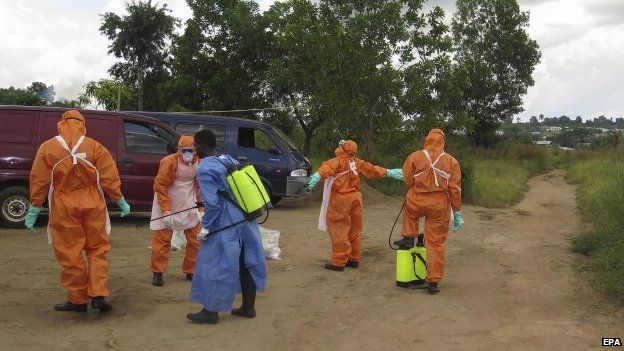Ebola crisis: Worst-hit African nations get key supplies
- Published

Vital supplies and resources to tackle Ebola are beginning to arrive in the three worst-hit West African countries, Ghana's President John Mahama has said.
Mr Mahama, who heads the regional bloc Ecowas, also told the BBC that treatment centres were being set up in Guinea, Liberia and Sierra Leone.
But he called for proper co-ordination between agencies to avoid duplication.
The outbreak has killed more than 4,500 people, almost all of them in those three countries.
An estimated 70% of those infected have died.
Meanwhile, Nigeria was declared free of Ebola after six weeks with no new cases, the World Health Organization said on Monday.
Last week, Senegal was declared virus-free.
In other developments:
- The United Nations said one of its workers in Sierra Leone had died from the disease, becoming the third UN victim
- US health officials said 43 people closely monitored after coming into contact with Ebola victim Thomas Eric Duncan had been given the all-clear after 21 days
- Stricter guidelines have been issued for protecting US healthcare workers
- The Spanish government said a nurse who became the first person to contract Ebola outside West Africa had now tested negative for the virus
- Liberian President Ellen Johnson Sirleaf's son, physician James Adama Sirleaf, has decided to stay in the US, saying he could do more for his country there than at home, the Wall Street Journal reports.
'Closing gaps'
Mr Mahama told the BBC that the World Food Programme was airlifting humanitarian aid to Liberia, Sierra Leone and Guinea.
Will Ross in Nigeria spoke to a doctor about how to treat the early stages
"Vehicles, motorcycles and other means of transport are going in there. There's more protective clothing being provided," he said.
"But there's no need for us to duplicate each other and have more treatment centres when we do not have volunteers and health workers to treat the people in the treatment centres.
"It must be a balance of things, closing all the gaps that exist and make sure that optimally the resources are going towards containing the disease," the Ghanaian president added.
Mr Mahama said he had convened an Ecowas summit in November to co-ordinate the international response.
He said other West African nations needed to learn lessons from Nigeria.
'Good idea'
Meanwhile, European Union foreign ministers met in Luxembourg to discuss how to strengthen their response to Ebola.
Speaking on the sidelines, French Foreign Minister Laurent Fabius said he expected the meeting to appoint a co-ordinator to galvanise the EU's response to the epidemic.
"My colleagues are unanimous in saying that this idea of a European co-ordinator for the fight against Ebola is a good idea," he said.
Catherine Ashton: ''The (Ebola) situation requires a fast response''
"The name will be chosen in the coming days. I think it's a very important step."
European countries have committed more than 500m euros (£400m; $600m) but the UK is pressing for that amount to be doubled.
The money is being sought to help reinforce overstretched healthcare systems in Liberia, Sierra Leone and Guinea and to mitigate the damage Ebola is doing to their economies.
- Avoid direct contact with sick patients as the virus is spread through contaminated body fluids
- Wear protective cover for eyes
- Clothing and clinical waste should be incinerated and any medical equipment that needs to be kept should be decontaminated
- People who recover from Ebola should abstain from sex or use condoms for three months
'No goggles'
Meanwhile, the US Centers for Disease Control and Prevention (CDC) announced stringent new guidelines for healthcare personnel who may be dealing with Ebola patients.
It said employees must be repeatedly trained in the use of protective equipment, demonstrating competency in putting on and taking off such clothing.
No skin should be exposed, the CDC said, and the gear should include gloves, a waterproof gown or coveralls, a respirator, a face shield and a disposable hood.
"Goggles are no longer recommended as they may not provide complete skin coverage in comparison to a single use disposable full face shield," it said.
It added that a trained observer must be present to watch every step of the process of putting on and taking off the protective equipment.
Ebola virus disease (EVD)
How Ebola survivors’ blood is saving lives
- Symptoms include high fever, bleeding and central nervous system damage
- Spread by body fluids, such as blood and saliva
- Fatality rate can reach 90% - but current outbreak has mortality rate of about 70%
- Incubation period is two to 21 days
- There is no proven vaccine or cure
- Supportive care such as rehydrating patients who have diarrhoea and vomiting can help recovery
- Fruit bats, a delicacy for some West Africans, are considered to be virus's natural host
Are you affected this story? Email us with your photos and videos if it is safe to do so at: haveyoursay@bbc.co.uk Please leave your contact details if you are happy to speak to a BBC journalist.
Send your pictures and videos to yourpics@bbc.co.uk or text them to 61124 (UK) or +44 7624 800 100 (international). Or you can upload here.